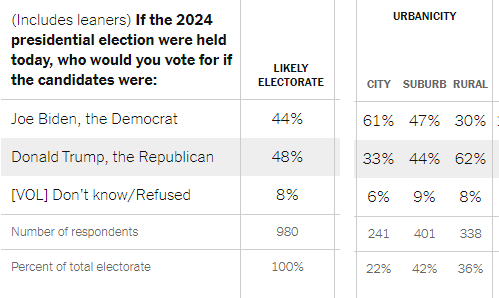New York Times Polls Doing That Thing Again
The data seems goofy. But the reporting is weird too!

The New York Times has been busy this week delving into its latest poll, conducted with Siena College, and it’s finding all sorts of terrible news for Joe Biden, like how voters seem to think Donald Trump is a better leader, or they think Donald Trump’s “policies” helped them more than Joe Biden’s have, and, in one really egregious bit of spin, Americans have become less likely to say Trump committed serious crimes, although oops, that story — the topic of which is “do Americans think Trump committed serious crimes” — leaves out the top-line result that the majority of Americans in fact think Trump did serious crimes.
It also thinks Trump is tied with Biden among women, and handily beating him with Millennials. Which tells us everything we need to know about this poll, which is that it is BAD, VERY BAD, IT IS A IDIOT AND A ASS.
Frankly, with seven months to go until the election, we’re still not inclined to panic, particularly given the shaky performance of polls in the last few elections. On the basic “who would you vote for if the election were held today?” question, Trump gets 48 percent and Biden 44 percent among likely voters, with the 3.8 percent margin of error making it pretty much a dead heat. And as several people have pointed out on Twitter, it seems weird that the poll identifies its sample population as around 35 percent rural, in both this and the previous Times-Siena survey from December. Isn’t that a little high? (Image edited to move “urbanicity” next to results.)
As for the focus on whether people think Biden’s or Trump’s policies were good for them (gift link), we’re a bit mystified: The poll really does show that across most demographics, respondents tended to say that Biden’s policies have hurt them personally (43 percent overall) while they think Trump’s policies helped them personally (40 percent overall) — although for both candidates, well over a third said the policies hadn’t made much difference either way.
One demographic with a difference: College-educated folks were down on Biden, with just 25 percent saying he’d helped them and 39 percent saying he’d hurt them, but they really didn’t care for Trump, with 34 percent saying he’d helped and 40 percent saying he’d hurt them.
The Times article on that section of the poll helpfully points out that’s at least in part just how people tend to think of previous presidents:
That presidents are frequently remembered more fondly once they leave office is nothing new. In a retrospective look at nine of the past 11 presidents, approval of job performance increased 12 percentage points after leaving office, both on average and for Mr. Trump in particular, according to a Gallup poll from June.
Also extremely weird — so weird, in fact, that we’re having a difficult time believing it — is this bit:
Women are 20 percentage points more likely to say that Mr. Trump’s policies have helped them than Mr. Biden’s have, despite the fact that Mr. Trump installed Supreme Court justices who ultimately overturned the right to an abortion and that about two-thirds of women in America think that abortion should be legal in all or most instances.
Overall, the share of women who think Mr. Trump’s policies have helped them stands at 39 percent, with 26 percent saying his policies hurt them and 34 percent saying they didn’t make much of a difference.
Yes, indeed, what the actual fuck? Those numbers don’t seem to line up at all with the actual outcomes of every election since the Supremes overturned Roe.
Finally, let’s enjoy this thoughtful dissection by Jamison Foser of how the Times reported — or misreported — its own poll’s findings on what Americans think of Donald Trump’s criminality. In a big bold headline yesterday, the Times proclaimed “Fewer Voters Think Trump Committed Crimes, Polls Show.” (Not gonna link this time.)
The story focused on the measurable downward shift, between December and late February, in the percentages of people who answered yes to the question “Do you think that Donald Trump has or has not committed any serious federal crimes?” And by golly, the article hit that point hard, says Foser:
For more than 1,100 words, the Times portrayed the findings as good news for Trump, from the headline to the statement that “voters across the political spectrum are now less likely to say that Mr. Trump acted criminally” to “Mr. Trump’s team … are less concerned that the specifics in the case will hurt him with voters, who they think have become inured to reports about his personal behavior” to quoting two poll respondents, both of whom said they did not think Trump has committed crimes.
But there’s just one itty-bitty detail the Times didn’t mention: In both December and February, the majority of respondents agreed that Trump had in fact committed serious federal crimes — 58 percent in December, and 53 percent in February. In December, 33 percent said Trump hadn’t crimed, and that rose a little bit to 36 percent in February. That’s kind of fucked, is it not? Says Foser:
That’s right: In an article entirely about a poll question asking if people think Trump committed serious crimes, the New York Times never once told readers that most people think he did commit serious crimes. It instead portrayed the poll finding as good news for Trump, and quoted only respondents who said he did not commit crimes.
Well sure, maybe it was dishonest, but it was all “accurate,” at least if you pretend the topline numbers don’t matter.
In conclusion we do not like or trust The New York Times again today, the end.
[NYT-Siena poll crosstabs / NYT (gift link)]
Yr Wonkette is funded entirely by reader donations. If you can, please subscribe, or if you’re a rural juror who finds a one-time donation more convenient, we are delighted to offer you this button to click!




"In conclusion we do not like or trust The New York Times again today, the end."
Bad faith all the way up.
They asked 14 people wearing MAGA hats and one old guy in line at the gas station and that's how they got their percentages -
this goes back to when Reagan was crushing Jimmy Carter and the advertising went down to zero - now; they run samples that have it "close" always, so they get juice each side for advertising. Especially now with Twit & Facepalm & Knick-Knack in the mix.